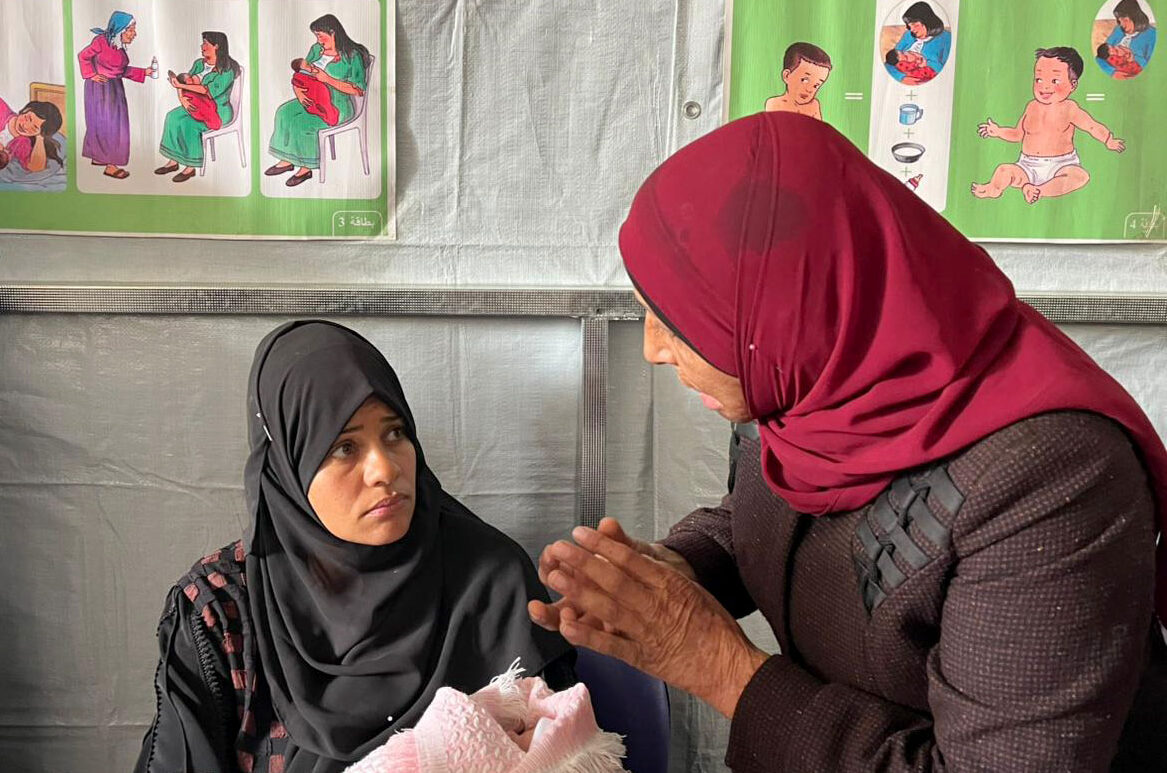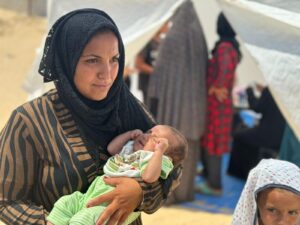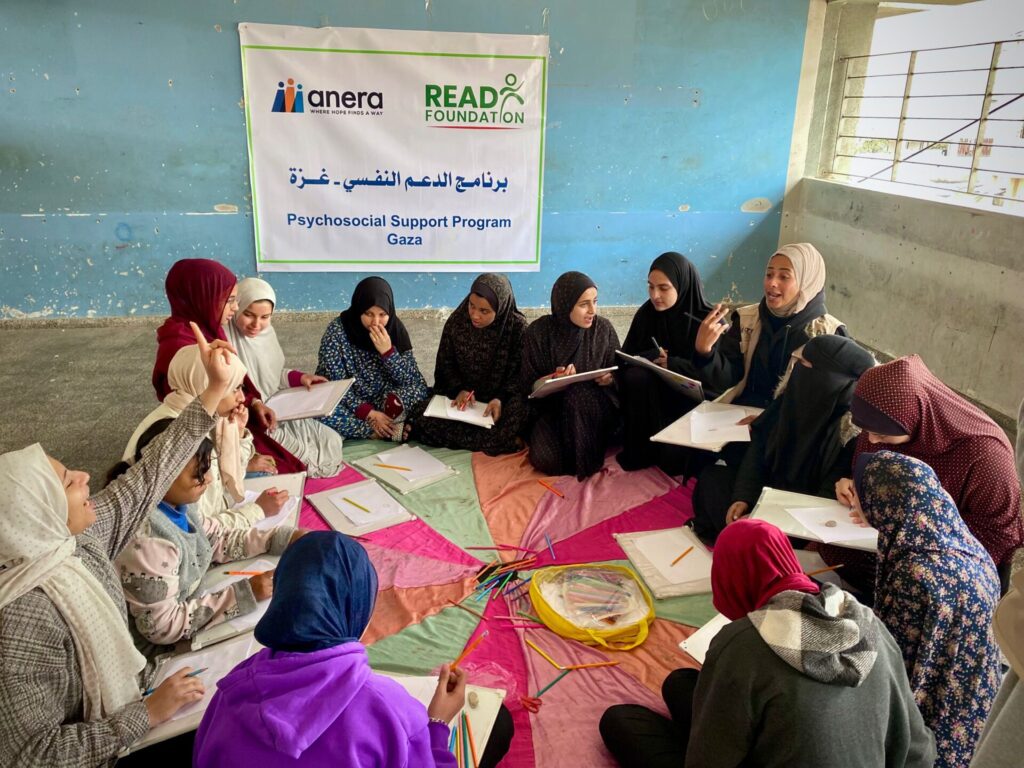A Look at Women’s Health Across The Globe
Posted in: Programs
From maternal care to mental health, here’s some insight into women’s health in 2025.


Today, women’s health is shaped by a range of overlapping challenges – from conflict and poverty to climate change and systemic inequality. While there have been important strides, such as a global decline in maternal mortality, many women continue to face serious health risks, particularly in crisis-affected and resource-limited areas. From maternal care to menstrual hygiene, mental health, and the growing impact of climate change, the following sections offer insight into some of the most pressing issues currently affecting women’s health around the world.
Maternal Health
In the most recent report on the subject, the World Health Organization reported that the maternal mortality rate is on a steady decline across the globe. This progress is attributable to improved access to medical care, advancements in medicine and technology, and skilled healthcare professionals. However, in areas where expecting mothers are at an increased risk of infection, experience high levels of stress, and lack access to essential medications, the risk of death increases. Likewise, in the United States, maternal mortality is actually on the rise.
And even when pregnancy is met with care from the first trimester to delivery, many women report insufficient access to follow-up care post childbirth. For women who live in areas that are subject to ongoing conflict such as those in South Sudan, where childbirth is the leading cause of death for women, or Gaza, where there’s a reported surge in miscarriages, they face a heightened risk of poor maternal health throughout the entire process.
The ongoing military bombardments in Gaza have severely impacted maternal health and safety. In 2024, UN Women reported that two mothers were killed in Gaza every hour. Additionally, the International Planned Parenthood Federation reported that miscarriages in Gaza have increased by a staggering 300% — largely due to the destruction of healthcare infrastructure, harsh environmental conditions, shortages of medical supplies, and continued displacement. These factors create conditions that expose mothers to severe physical and psychological harm.
In response to the growing threat to maternal health in Gaza, Anera established mobile health clinics focusing on maternal and child health. These specialized clinics provide free, comprehensive healthcare services tailored to the needs of mothers and children. Services include pediatric consultations with specialized care from a pediatrician, general medical check-ups, obstetric and gynecological consultations for pregnant women, and nutritional counseling sessions.


A mother with her baby at Anera's clinic for mothers and children in Gaza.
Menstrual Health
Recent reports indicate that an estimated 500 million people lack access to menstrual products and adequate facilities for menstrual hygiene management. This stems from a multitude of factors, including poverty. Poverty typically leads to decreased access to menstrual supplies, and scholars expect that the rate of period poverty will increase as poverty levels rise across the globe. Additionally, social stigma around menstrual health prevents healthy menstrual care solutions and leads to devastating consequences, such as missed school days, missed work days, life-threatening infections, and negative long-term mental health implications.
In Lebanon, where menstrual product prices have surged by 500% since 2019 — a result of the economic crisis — both rising costs and stigma around menstrual health create challenging conditions for women and girls. Community-focused programs that promote awareness and de-stigmatization are part of an ongoing solution to combat menstrual health disparities, such as Anera’s initiatives to provide young girls and women with awareness sessions and menstrual hygiene kits to ease burden.


Mental Health
In recent years, women’s mental health has faced growing challenges across the globe, especially in regions impacted by war, displacement, and systemic inequality. Studies and humanitarian reports show alarming increases in depression, anxiety, PTSD, and gender-based violence, particularly in areas prone to conflict like the Middle East and North Africa. Ongoing conflicts, economic instability, and disrupted access to education and healthcare have left women disproportionately vulnerable, with many also carrying the burden of caregiving and trauma in silence. In places like Ukraine and the Democratic Republic of Congo, women report high rates of psychological distress, often without access to adequate support. Despite growing awareness, gaps in research, funding, and service delivery continue to hold back meaningful progress.
Palestine and Lebanon are among the regions where women’s mental health remains a significant concern. In Gaza, the protracted conflict and large-scale displacement have led to severe psychological distress, particularly among women living in overcrowded shelters with limited access to services. In the West Bank, frequent exposure to violence, movement restrictions, and economic hardship contribute to chronic stress and anxiety. In Lebanon, the ongoing economic crisis and lack of resources have further impacted women’s mental well-being, including Palestinian and Syrian refugee communities. To address these challenges, Anera supports mental health and psychosocial well-being through programs such as psychosocial support sessions, community-based group activities, and safe spaces for women and girls that promote positive coping skills in the face of ongoing adversity.


Psychosocial support activities for women in Gaza, directed by Anera and supported by the READ Foundation.
Impacts of Climate Change
Climate change is reshaping global health in ways that disproportionately affect women. Across regions facing rising temperatures, extreme weather, and resource scarcity, women often carry greater responsibilities for household needs like food, water, and caregiving. These duties, intensified by environmental stress, expose them more directly to health risks, from waterborne illnesses to physical strain and heat-related illness.
Extreme heat and air pollution have been linked to serious complications, including higher rates of preterm birth, low birth weight, and maternal hypertension. As climate change fuels food insecurity, many women also face malnutrition during pregnancy, which can impact both maternal health and child development. These risks are amplified in areas where access to prenatal care is disrupted by disasters or under-resourced healthcare systems.
In response to these growing challenges, Anera invests in sustainable solutions that directly support women’s health and resilience in vulnerable communities. One such initiative is our hydroponic garden program. Hydroponics generally use 90% less water than traditional soil-based gardening. These innovative systems empower families, including women-headed households, by providing them with the tools and training to grow fresh produce using significantly less water than traditional farming methods. This program helps women and their families meet their nutritional needs, preserves water in regions facing water scarcity, and creates opportunities to generate income by selling surplus crops.
Recognizing the unique ways climate change affects women’s health is key to creating effective responses. This includes ensuring healthcare systems are resilient, accessible, and equity-forward in design and implementation. Investing in sustainable solutions, such as clean energy, climate-resilient agriculture, and safe infrastructure, can reduce long-term risks while supporting community health and stability.


One recipient of Anera's hydroponic gardens.
The issues listed are not comprehensive, but give insight to some of the most pressing concerns surrounding women’s health across the globe. Addressing these issues requires sustained interventions, such as those led by Anera, that prioritize access, dignity, and long-term care.
To stay updated on the latest news on women’s health, sustainable solutions, and humanitarian efforts from Gaza and beyond, sign-up to our newsletter.
